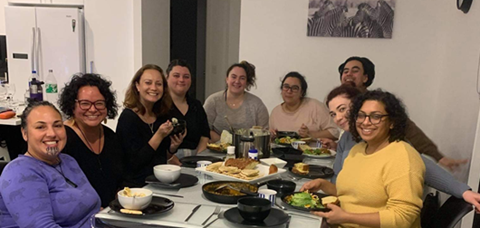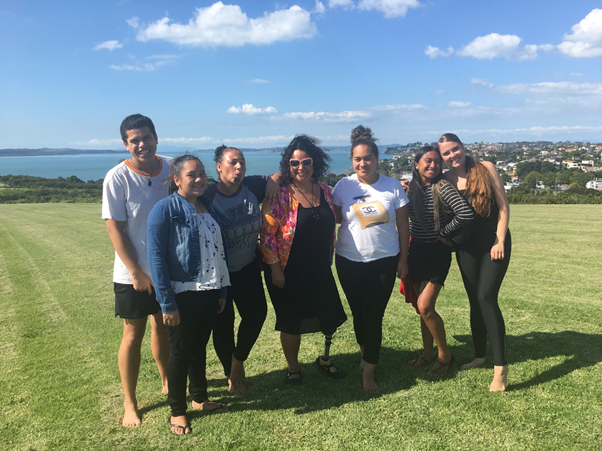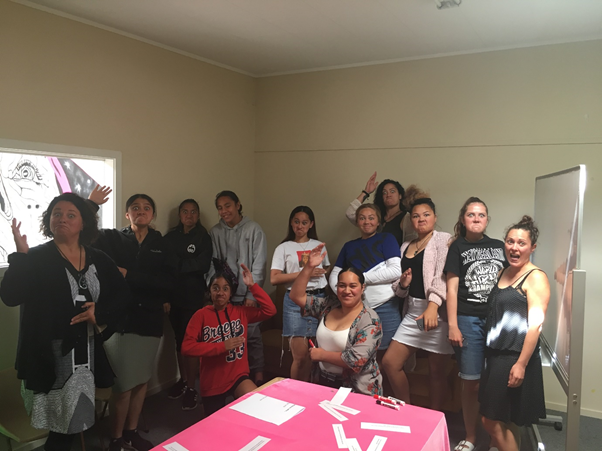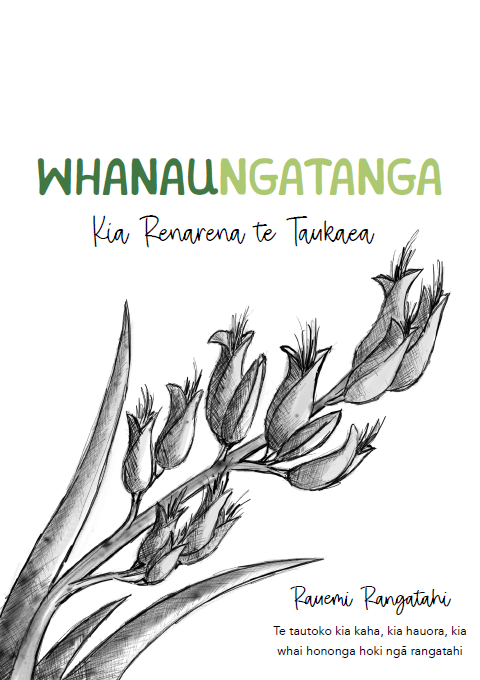This page shares Maori-specific findings from the Harnessing the Spark of Life Study and Māori-specific results from the Youth19 Rangatahi Smart Survey.
Harnessing the Spark of Life:
Maximising whānau contributors to rangatahi wellbeing
HRC project Investigators: Terryann Clark, Jade Le Grice, Shiloh Groot, Matt Shepherd and Sonia Lewycka.
What is Harnessing the Spark of Life?
This study has helped us understand more about what supports rangatahi Maori to thrive. We intuitively knew that whanaungatanga is important for wellbeing, yet there had been little known about how whanaungatanga operates in the busy modern lives of rangatahi. We also wanted to know what families, health and social service providers can do to help support whanaungatanga and ensure that rangatahi are connected, healthy and well.
How did we do this?
This was a three-part study. First, 51 rangatahi and their whānau took part in a photo elicitation project. Young people were given an internet tablet and asked to take photos of things, people, places that made them feel connected, supported and well. These rangatahi and their whānau then engaged in storytelling about these photos with our researchers. We have gleaned such wonderful insights into the lives of rangatahi and what made them feel loved, strong, and connected (Methods paper in preparation).
The second part of the study involved taking these learnings and putting questions into the Youth19 Rangatahi Smart Survey, specifically about whanaungatanga. We undertook the representative survey of 7,500 young people from Waikato, Tamaki Makaurau and Taitokerau, with 1,528 (20%) of those who did the survey being rangatahi Maori.
The third and final part of the study was to develop resources for rangatahi and their whānau. We also have published some papers and have others in development.
Harnessing the Spark of Life: What did we find?
We found that many whānau were doing a great job engaging in whanaungatanga, despite many challenges. Whanaungatanga happened in the small everyday interactions like taking time to have a cup of tea or in the car on the way to a sports game. It happened when whānau gathered for special events, kapa haka competitions or waka ama. It also happened when they learned about whakapapa (genealogy), their tupuna (ancestors) and nga taiao (the environment). We have highlighted a range of important components of whanaungatanga in our publications and resources. From the Youth19 rangatahi smart survey, we found that whanaungatanga was protective for a range of hauora outcomes, including improved mental health.
FREE RESOURCES FOR WHĀNAU AND RANGATAHI
We developed some resources for rangatahi and whānau.
Rangatahi Resource
Rangatahi told us six key things that helped them to thrive – we have developed this resource in te reo Māori and te reo Pākehā.
Whānau Resource
Rangatahi told us six key things that their whānau and friends do that support them to thrive – we have developed this resource for whānau to help them support their rangatahi. Download in te reo Māori and te reo Pākehā.
HARNESSING THE SPARK OF LIFE - ACADEMIC PAPERS, THESES/DISSERTATIONS, CONFERENCE PRESENTATIONS, & WEBINARS
Webinars
Publications
We also have peer-reviewed publications about various findings from this study. These will be updated as they are published – please sign up to receive our updates via the link on our homepage.
Measuring whanaungatanga and identity for well-being in rangatahi Māori by Greaves et al (2021)
Whanaungatanga and Takatāpui rangatahi by Hamley et al (2021)
“You’re the One That Was on Uncle’s Wall!”: Identity, Whanaungatanga and Connection for Takatāpui (LGBTQ+ Māori)Stakeholders persectives of whanaungatanga and how health and social services can respond more effectively to rangatahi Māori and their whānau by Latimer et al (2021)
‘Why would you give your children to something you don’t trust?’: Rangatahi health and social services and the pursuit of tino rangatiratanga
Under submission & in press
Measuring Whanaungatanga and Identity for Rangatahi Māori Wellbeing: Creating a Scale using the Youth19 Rangatahi Smart Survey. MAI Journal by Greaves et al, (in press)
Te Tapatoru: a model of whanaungatanga to support rangatahi wellbeing (Hamley et al, 2022)
Close to submission
Rangatahi Wellbeing and the Whānau Chocolate Box by Marsh et al.
What’s good for rangatahi Māori, is good for all youth: Whanaungatanga and the associations with positive mental health outcomes among New Zealand secondary school students by Schwencke et al.
Whanaungatanga-iho: Dynamic Enactments of Whanaungatanga by Harrison et al.
Methodology paper by Groot et al.
Masters theses and dissertations
How rangatahi Māori understand tough times and when they decide to access support and engage with mental health and other support services (2020). Masters Dissertation by Noema Arnold, School of Nursing, Faculty of Medical Health Sciences, University of Auckland
Whanaungatanga: The impact on the mental health and wellbeing of rangatahi experiencing emotional and mental health concerns (2020). Masters Dissertation by Melanie Sloane, School of Nursing, Faculty of Medical Health Sciences, University of Auckland
Whakaahua taiao, whakaahua whanau: whanaungatanga and rangatahi hauora (currently completing) Masters Dissertation by Larissa Renfrew, School of Psychology, Faulty of Science, University of Auckland
Honouring our Past, Fostering our Future: Rangatahi Māori experiences of Identity, whanaungatanga. (currently completing). Masters thesis by Keryn Koopu, School of Psychology, Faculty of Science, University of Auckland.
Whakahikitia te rangatahi, whakahikitia te whānau. (currently completing). Ph.D. thesis by Sierra Tane, School of Psychology, Faculty of Science, University of Auckland.
Education Engagement, Whanaungatanga and Rangatahi Māori Aspirations - Title yet to be confirmed.(under development). Masters thesis by Davina Mossman, School of Psychology, Faculty of Science, University of Auckland.
Conference presentations
Hamley, L., Parkinson, H., Tane, S. & Renfrew, L. (2021). Symposium: The glue that binds us together: Rangatahi (Māori youth) impressions of whanaungatanga. The International Society for Critical Health Psychology, 24 August 2021.
Le Grice, J., Hamley, H. Clark, T. (2021). Youth19 Showcase & Harnessing the Spark of Life: Maximising Whānau Contributors to Rangatahi Wellbeing, Victoria University, Wellington, 12th August 2021.
Tane, S. Le Grice, J. & Clark, C. (2019). “Because we were all doing it there together and we were there for each other.” 13th Biennial Conference of the Asian Association of Social Psychology, Academia Sinica, Taipei, Taiwan, 13th July 2019.
Clark, T.C., Le Grice J., Groot, S., Shepherd, M., Lewycka, S., Barber, C., Beckford, K., Tane, S., Martinussen, M., Williams, A., Cox, K., Silveira, M., Parkinson, H. (2019). Whanaungatanga as a research resource. NAISA conference, Hamilton, 26-29th June, 2019.
Scholarships and grants associated with project
Te Maringi Marsh (2020) Faculty of Science, The University of Auckland Summer Studentship
HARNESSING THE SPARK OF LIFE - SOCIAL MEDIA CAMPAIGN
Here are a range of social media campaigns to help share information with rangatahi and their whānau on key messages from our study.
HARNESSING THE SPARK OF LIFE ROOPU
Rangahau Roopu
Terryann Clark (Ngāpuhi/ Pākehā)
Jade Le Grice (Te Rarawa/ Ngāpuhi)
Shiloh Groot (Ngāti Uenukukopako/ Ngāti Pikiao)
Sonia Lewycka (Ukrainian)
Matt Shepherd (Ngāti Tama)
We have had a large number of incredibly skilled and passionate researchers, research fellows, students and assistants who have helped shape, collect and analyse data throughout this project over the four-year period:
Angela Carr (Pākehā), Ariel Schwencke (Ngāpuhi), Ashlea Gillon (Ngāti Awa, Ngāpuhi), Ashlea Williams (Ngāti Porou/ Ngāti Rangitihi/ Te Whānau a Apanui/ Rarotonga ki Aorangi/ Aitutaki/ Manihiki), Brad Drayton (Ngāi Tahu, Pākehā), Charmaine Barber (Ngāti Kahungunu ki Te Wairoa), Chelvica Ariyanayagam, Cinnamon Latimer ( Ngāpuhi, Ngāti Whatua, Ngāti Porou and Ngati Kahu), Davina Mossman (Tūhoe and Ngāti Awa), Hineatua Parkinson (Whakatoea/ Ngati Hine/ Ngati Patuwai), Kara Beckford (Ngāti Whakaue/ Ngāti Tunohopu), Kendra Cox (Te Ure o Uenukukōpako, Te Whakatōhea, Ngāi Tūhoe, Ngāti Porou), Kerryn Koopu (Ngāti Kahungunu/ Te Whānau ā Apanui), Lara Greaves (Ngāti Kuri, Ngāpuhi), Larissa Renfrew (Te Rarawa/ Ngāpuhi/ Ngāti Paoa/ Tainui), Logan Hamley (Ngāti Rangi, Whanganui, Pākehā), Maddy Manchi (Indian), Melanie Sloane (Ngai Tahu), Maree Martinussen (Te Aitanga-a-Mahaki), Maia Silveira (Ngati Mahanga, Ngati Raukawa), Noema Arnold (Ngati Porou), Nicola Harrison (Ngaī Te Rangi / Ngati Raukawa ki Waikatō), Nidhi Aggarwal (Indian), Rachel McClintock (Waikato/Maniapoto/ Ngāti Porou /Ngāti Mutunga), Sierra Tane (Te Roroa/ Ngāpuhi/ Ngāti Whatua ki Kaipara), Te Maringi Marsh (Te Arawa/ Ngāti Pikiao/ Tapuika Ngāti Mākino).
Advisory Roopu
We had two advisory groups who helped guide us throughout this project. We would like to acknowledge our rangatahi advisory roopu and rangatira/kaumatua advisory group for their support, encouragement and wisdom throughout this project.
Rangatahi advisory roopu
Rhoen Hemara, Naia Dunn, Ayla Dunn, Aretha Ngāwaka, Padre Brown, Rangikahiwa Ratima, Samantha Cooper, Archie-Lee Prior, Phoenix Prior, Ripeka Kent, Ka Te Ao Toia, Te Tuhimareikura Hopa.



Kaumatua / Rangatira advisory roopu
Katene Paenga, Moe Milne, Stella Black, Kahu McClintock, Julie Wade, Belinda Borell, Steve Cribb, Toia Chase & Rawiri Wharemate.
Acknowledgements
We would acknowledge Sha Love who also passed away during this project who provided support in the early part of the project. Also, to our kaumatua Rawiri Wharemate who generously gave his wisdom and support throughout this project and over many years, who passed away toward the end of this project. Moe mai rā e ngā rangatira.
Funding
We gratefully acknowledge HRC for funding this project:
HRC Project Grant – 17/315 Clark – Harnessing the spark of life: Maximising whānau contributors to rangatahi wellbeing
HRC Knowledge Translation Grant – 21/015 - Accessible digital resources for rangatahi and their whānau
Ethics
This project had ethnical approval via The University of Auckland Human Participants Ethics Committee (Protocol reference 020085).
Youth19 Research Team
Finally, we would like to acknowledge our partnership with the Integrated Survey and Intervention Research for Youth Health Gains led by Associate Professor Terry Fleming’s HRC project, who co-funded the Youth19 rangatahi Smart Survey. We would not have been able to do this study without your support.
Youth19 Rangatahi Smart Survey Māori-specific findings
All our Youth19 reports have Maori specific analysis covering a wide range of issues like housing, school, mental health, substance use, disability, sexual health etc.






